Nov
The Real Country–No. 10
in Music

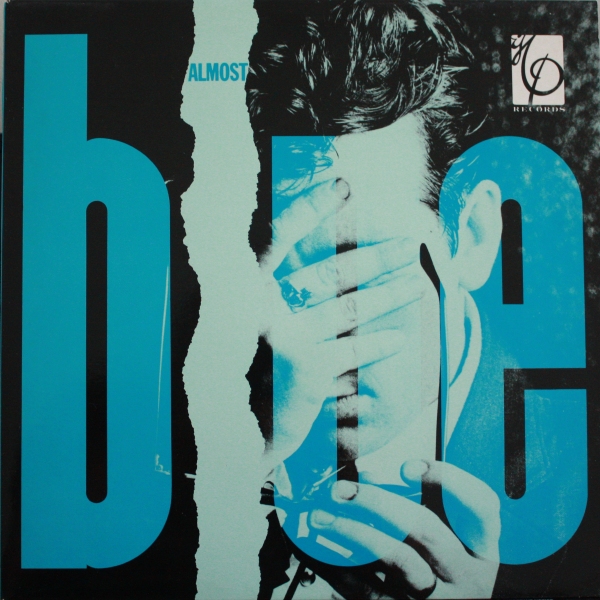
Real country music is not the sole domain of Americans (or even North Americans). Ferheavensake, various facets and forerunners of American country music originated in Scotland, England and Ireland, amongst others. It’s no wonder that many folks from the United Kingdom, Australia, various other Anglophone countries, and even non-Anglophonic countries have taken to country music and adopted it as their own.
One such adopter is the great music omnivore, Elvis Costello. Though we know many differ, we love Costello’s voice and phrasing, and his way with songs of any and all music genres. Costello has been a huge proponent and lover of real country music for decades, going so far as to record an entire album of country music covers in 1981 on his record, “Almost Blue” and subsequently recording and performing various other real-country songs. As an aside, The New Yorker has a worthwhile profile of Costello in its November 8, 2010 issue, in which the author touts Costello’s deep and superior knowledge of American music.

And here on the song Brown and Blue from that record, Costello covers a song made famous by George Jones (more on Jones another time), a song that has all the elements of great country music: heartbreak expressed in common-man terms (but with the occasional clever turn-of-the-phrase, as here), with fundamental instrumentation and heartfelt delivery. Elvis was recently divorced when he recorded this song, so it’s no wonder his vocals ring particularly true.
Listen in to Elvis Costello singing real country music below.
Elvis Costello–Brown to Blue
We like the chorus:
“I couldn’t help my tears from falling on the courtroom floor
My love, they took away my right to love you anymore
My world just seemed to stop as I stood there so close to you
You changed your name from Brown to Jones and mine from Brown to Blue”
Nov
The Walkmen–Walk, Don’t Run, to Lisbon
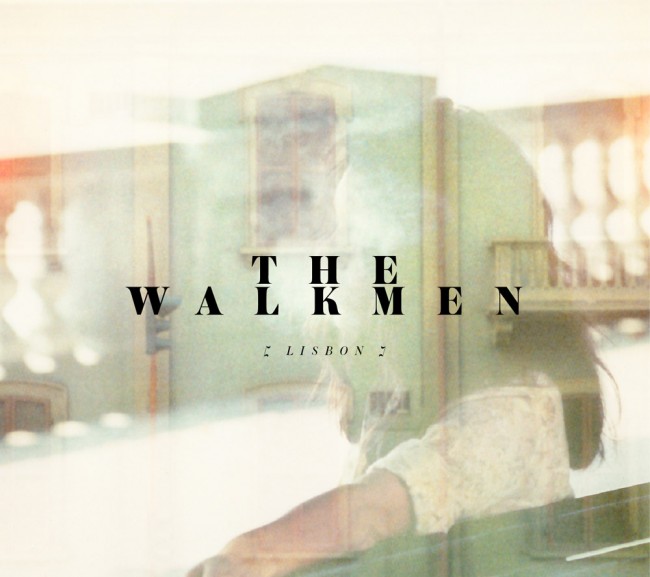
We were minding our business while watching Fallon’s show in mid-September when up came The Walkmen and sucked us up against the screen. We’ve loved the band’s intensity and delivery over the years, but have appreciated the recent re-evaluation and evolution by the band that in 2008 resulted in the ravishing record, “You & Me,” and has now rendered “Lisbon.”
The Walkmen began ten years ago in Washington, D.C., moved on to New York, spread to Philadelphia and now also also occupy New Orleans. With that geographical juggernaut and splintering, it’s not a huge surprise that the group decided to gather, write and record in Lisbon, Portugal, and then dedicate the new record to that much-loved city.
We hear in the new album a move to an even more spare, reverb-soaked sound, but with hooks and subtleties aplenty. Best known for dark, intense songs such as The Rat and In the New Year, “Lisbon” intermittently murmurs optimism and assurance within the band’s usual tenebrous realism.
At its core, the band has always been built around singer Hamilton Leithauser’s garbled, squalling vocals, Paul Maroon’s sparkling guitar, Matt Barrick’s swarming drums and assorted keyboard coloratura. While these are all still well-represented on “Lisbon,” we hear a more dynamic, incisive, elemental take on the sound.
Lisbon is amongst 2010’s stalwart records and deserves the replay setting on your playlist. We highlight some of our favorites off Lisbon below.
The band performed Angela Surf City on Fallon, and for good reason. The song defines Lisbon’s sound, though at its most aggressive. It starts like a head-high day awaiting a big north swell, with Barrick’s spare, martial drumming before the guitar ventures in vaguely Venture-ish and then adds Leithauser’s quiet but tense vocals. And then at the 54-second mark the chorus kicks in like a rogue wave, gargantuan and ferocious, with Barrick rattling thunderclap drums and Leithauser soaring on vocals. The song ebbs and flows throughout, providing the most intense moments on the record. We like the chorus and stanzas below.
“You took the high road
I couldn’t find you, up there
You kept your jaw wired closed
I never noticed before
I used to see the signs
Now I dream of the time
I was holding onto you
For a lack of anything to do
Still the whitecaps roll away
Still your name rings true
Mine is yours, yours is yours
Life goes on, life goes on all around you
Let’s go home happy again
Just take your head from your hands
Take up the cause, just once more
I never noticed before.”
The Walkmen—Angela Surf City
[audio:https://www.thelefortreport.com/blog/wp-content/uploads/02-Angela-Surf-City.mp3|titles=02 Angela Surf City]We also love Torch Song, with its shimmering opening guitar and forlorn, high-plains wail-of-a-vocal that eventually segues into a throwback, doo wop, torch-song motif that is alternately unsettling and comforting. Like life.
The Walkmen—Torch Song
And below are some telling videos featuring Lisbon songs.
First up in the videos is album-opener, Juveniles. We love the lazy, jangling guitar and bass and the bouncing build of the song. And what’s not to like about the victorious resignation of which Leithauser sings?
“Oh country air
Is good for me
No matter who’s side I’m on
Let these dead leaves
Dry in the sun
I’ll be up and gone
There’s a stranger outside
Oh Lord!
He’s a wiser man than I
Oh Lord
I am a good man
By any count
And I see better things to come
Could she be right?
When she repeats
I am the lucky one
You’re one of us
Or one of them!”
The Walkmen – Juveniles – Live at Governor’s Island from Big Ass Lens on Vimeo.
And finally, Woe is Me starts out one-upping Vampire Weekend (a simpering signpost of a band by comparison) at their own game. The difference ultimately is the vernacular and delivery of Leithauser. He simply kills on this song, vocals and lyrics inclusive. There is loss, and there is next.
“There’s a girl that you should know
she was mine not so long ago
Had my number and we fell in love
She put me under and I got lost…
Woe is me
Woe is me
Hey do you want to walk with me?
By the trees and the factories.
Hey do you want to hop the fence?
In the sleepy red sunsets
Woe is me
Woe is me
Woe is me
Woe is me
Now the street light bright and pale
as we sip our ginger ale
I kiss you by the blinking signs
Don’t be heavy, let’s be light
On and on our merry way
On and on our merry way
On and on our merry way
On and on our merry way”
The Walkmen – Woe is Me – Live at Governor’s Island from Big Ass Lens on Vimeo.
Lisbon was released after The Walkmen signed to the great independent label Fat Possum. The Oxford, Mississippi-based label, traditionally home to rootsier bands, has seen recent progression, signing Band of Horses, Andrew Bird and indie surf-punk phenom Wavves. Go buy Lisbon and check out Fat Possum’s other offerings here.
Nov
Honey Child–On “Pianos on State” and On Your Speakers
in Music


We loved the recent Pianos on State initiative that took place last week.
According to the Pianos on State Facebook page, the event was a “collaborative musical experiment coinciding with the 2010 New Noise Music Festival and Conference. Pianos were placed at various locations up and down State St. from November 4-7th. Amateur and professional musicians were scheduled to perform and during open times anyone is welcome to sit down and play. The event was put on to raise awareness for the 2nd Annual Instrument Drive 4 Youth taking place on December 31, 2010 that collects new and used music instruments and equipment for disbursement through the school districts and other not-for profit organizations like Notes for Notes-a non-profit dedicated to providing youth with free access to music instruments, equipment and recording studio environments so that music may have a profoundly positive influence in their lives. Pianos on State is made possible by the collaborative efforts of the Santa Barbara Bowl, Ed Outreach at the Granada Theater, Notes for Notes, New Noise, The Santa Barbara Education Foundation and Santa Barbara Arts Commission.”

We applaud this effort and encourage you to support this initiative. We got to observe the pianos first hand and hear pros, amateurs and family members plinking and playing the pianos up, up and down State Street.
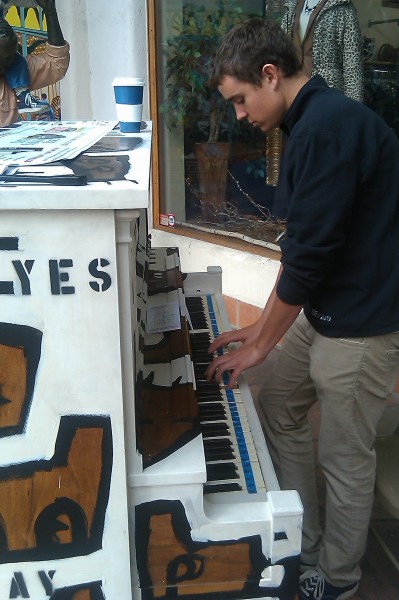
One of the highlights of Pianos on State occurred when the band “Honey Child” lit it up as can be viewed below. We look forward to catching them live soon. You can check out and download their latest album “Nearer the Earth” here. Between the video below of Pianos on State, a quick listen to their beguiling record and reviews of their shows, this looks like a band to keep a close eye on. We wish them well. Also included below is the band’s live guitar-barrage version of the same song, Away from Home. Don’t rule out more piano/acappella/handclap breakouts, boys.
Nov
In Honor of The New Conan–A Short Musical Retrospective of The Conan O’Brien Show
in Music

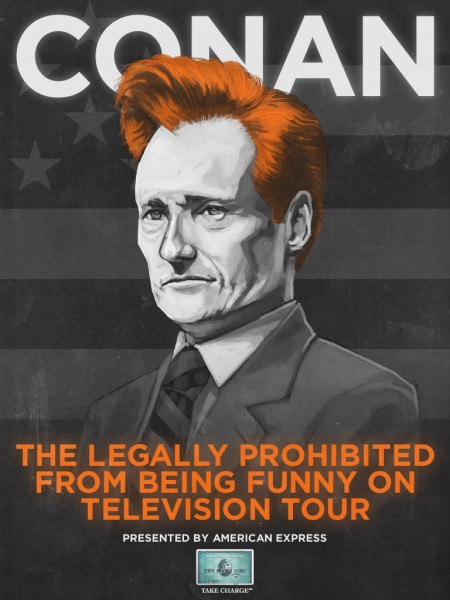
After finishing up his recent tour (see poster above), Conan’s new show is finally upon us. Say what you will about the non-musical bits of his prior show, but historically Conan has exhibited very good taste in music. He’s provided great performances by everyone from Bowie to Wilco to Neil Young to The National to the Strokes, and on and on. And he’s provided three great viewings of one of our and your (gotta be, right?) faves, Radiohead. Below is Radiohead’s 1993 performance of Creep, which is alternately glam (ya gotta love Yorke’s peroxide-blonde ‘doo) and overly theatrical. But despite these humorous distractions, even back then you could see the impending talent in spades. Check out Thom Yorke’s vocal squall at minute 3:00 and enjoy Johnny Greenwoods’ passionate guitar thrashing. If you can find them, the two other Radiohead performances were of Fake Plastic Trees in 1995 and House of Cards in 2008.
In addition to this hysterical historical performance by Radiohead, check out the comedic, but musically talented, Jonathan Richman perform one of our favorite Richman songs, I Was Dancing in the Lesbian Bar.
And finally, check out Neil Young’s send-off of Conan from the Tonight Show via his great song, Long May You Run.
Neil Young – Long May You Run from the last Tonight Show with Conan O’Brien from John Matthews on Vimeo.
We assume there will be more phenomenal performances on his new show on TBS. Bonne chance, Conan!
Nov
Talking Old Musicians–Leon Russell and Elton John
in Music

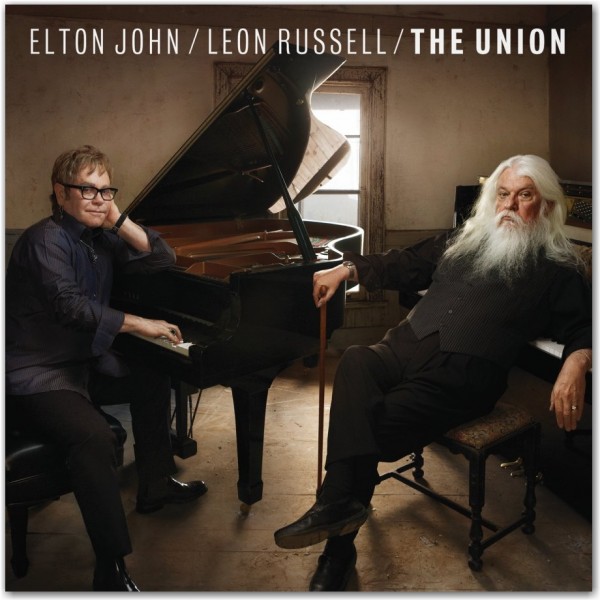
From 1970 to 1972 we spent a raft of time reconnoitering the recordings of Leon Russell and Elton John. During that time, Russell (who prior thereto had mostly been a keyboard session man) dominated record charts with his album “Carney” and marauded the musical midway with hit singles such as Tight Rope and Masquerade. Meanwhile, Elton (a big fun of Russell’s) was nearing the apex of his career, releasing signature albums such as “Tumbleweed Connection,” “Honky Chateau,” and “Madman Across the Water” (which included the critically and commercially applauded Levon and Tiny Dancer).
Unfortunately, both musicians would shortly thereafter falter creatively. Russell would have a minor hit with the likable Lady Blue in 1975, and Elton had a few more good creative years that would include the release of his masterpiece, “Goodbye Yellow Brick Road.” Neither man would hit those high water marks again creatively, though Elton and lyricist Bernie Taupin would continue to intermittently pen wondrous songs.
But lo and behold, after all the intervening years between then and now, Elton has managed to get together with Leon and record a new record, entitled “The Union,” produced by T-Bone Burnett. We suspect this record will sell handsomely in this nostalgic, boomer-engorged era. We hope the sales will help Leon financially and reinvigorate him creatively, and result in the public seeking out both his and Elton’s earlier creative zeniths. After listening to “The Union,” however, (and recalling the admonitions of our parents: “if you don’t have anything good to say, don’t say anything at all”) instead of reviewing their new joint venture, we give you below some of the earlier meisterworks of these musicians. And to be fair, way below is a cut off the new album and a video from John explaining how the new record came about.
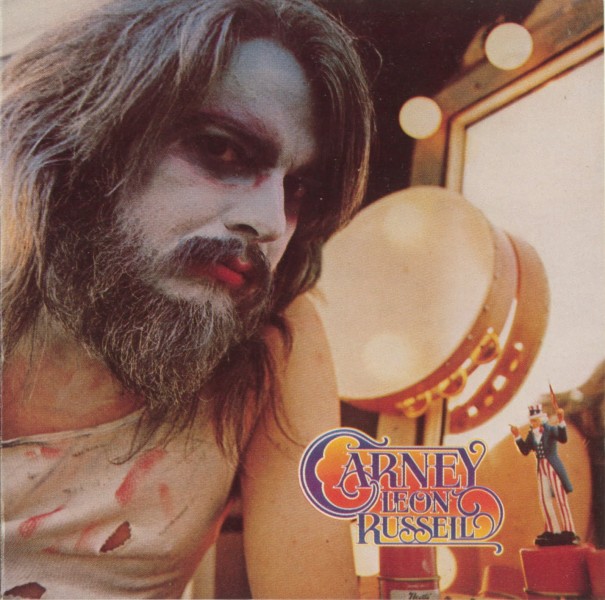
Leon Russell–Tight Rope
In case you have managed to miss it, check out the the off-kilter miasma of the music and vocals in Tight Rope, while Russell provides his life-lesson.
Cautionary verse:
“I’m up on the tightwire
flanked by life in the funeral pire
putting on a show
for you to see.”
Leon Russell–Song for You
This song was a megahit for The Carpenters, but we prefer Russell’s unvarnished and unique delivery.
[audio:https://www.thelefortreport.com/blog/wp-content/uploads/08-A-Song-For-You.mp3|titles=08 A Song For You]Leon Russell–Shoot Out the Plantation
And just to give you a glimpse as to why Elton so highly regarded Russell as a musician, songwriter and vocalist, check out his rocker, Shoot Out at the Plantation
[audio:https://www.thelefortreport.com/blog/wp-content/uploads/02-Shootout-At-The-Plantation.mp3|titles=02 Shootout At The Plantation]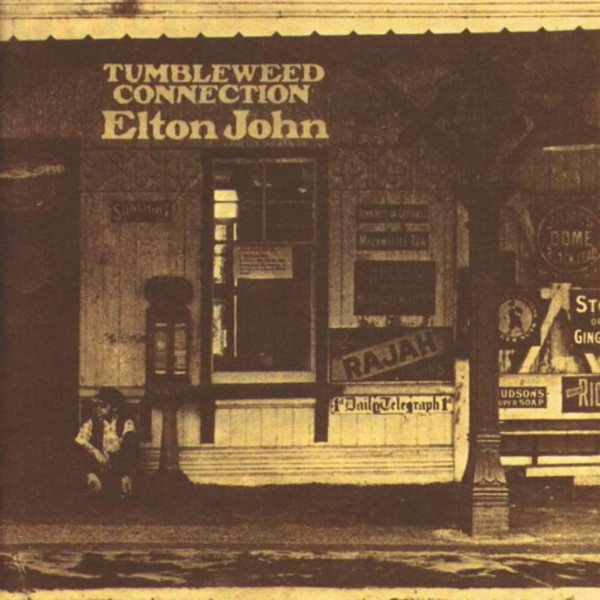
Elton John–Amoreena
“Tumbleweed Connection” was Elton’s and lyricist, Bernie Taupin’s, fine homage to American music and country-fied life. We also hear Elton’s early tip-of-the-hat to Russell’s piano playing in the intro and throughout this song.
Taupin was on his game on Tumbleweed Connection, including in this song.
“And she dreams of crystal streams
Of days gone by when we would lean
Laughing fit to burst upon each other”
Elton John–Come Down in Time
This ballad has a perfect closing couplet:
“There are women and women and some hold you tight
While some leave you counting the stars in the night”
Elton John–Talking Old Soldiers
Another affecting song by Elton, with a well-wrought stanza (or four) by Taupin:
“I know what they’re saying son
There goes old man Joe again
Well I may be mad at that I’ve seen enough
To make a man go out his brains
Well do they know what it’s like
To have a graveyard as a friend
`Cause that’s where they are boy, all of them
Don’t seem likely I’ll get friends like that again”
Below is one of the better songs off the new album. Is that Dumbledore or Gandalf on the right?
Here’s a video on the Russell/John collaboration.
Nov
The Real Country, No. 9
in Music

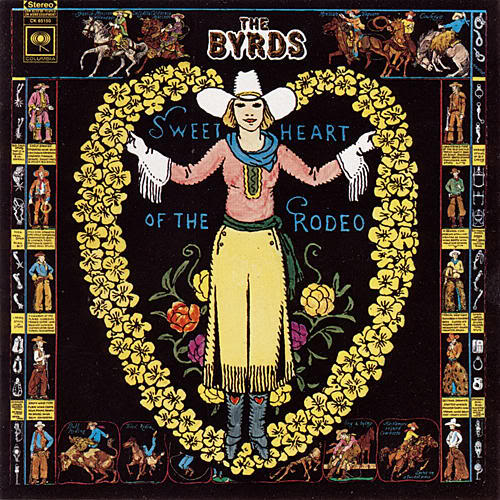
The Byrds are well known for their many 60s hits, such as Mr. Tambourine Man, Turn! Turn! Turn!, All I Really Want to Do, Eight Miles High, and So You Want To Be a Rock ‘N Roll. But after David Crosby and Gene Clark left the band, in 1968 The Byrds recorded what some consider the first “mainstream” country-rock album (dramatically pre-dating the Eagles, thought by many to have started the genre which would later segue to become “Americana”). Though the band had leaned country at times, they had never jumped into the genre like they did under the influence of new infiltrator, Gram Parsons. Though the album did not sell well, it was well-received by critics, and in 2003 was ranked #117 on Rolling Stone magazine’s list of The 500 Greatest Albums of All Time. Unfortunately, Parsons only lasted six months with The Byrds, ultimately bidding them adieu to hang out with Keith Richards in London instead of touring with The Byrds in apartheid-ruled South Africa.
One of the finest examples of country music from the album is the song Hickory Wind, written by Gram Parsons and Parson’s former band mate, Bob Buchanan, on a train ride the pair took from Florida to Los Angeles in early 1968. The Byrds ably backed Parsons on vocals, with the complete lineup consisting of John Hartford (fiddle), Lloyd Green, (pedal steel guitar), Roger McGuinn (banjo), Chris Hillman (bass), Kevin Kelley (drums), and Gram Parsons (piano).
Johnny Rogan, in his book “The Byrds: Timeless Flight Revisited,” offers the following take on Hickory Wind: “The alluring ‘Hickory Wind’ serves as a powerful image for Parsons’ bittersweet nostalgia, as he imagines an Edenic childhood of simple pleasures like climbing trees. During successive verses, he reflects on the pursuit of fame, the curse of wealth without spiritual satisfaction, and the perils of city life. What really makes the song, however, is Parsons’ aching vocal performance, set against a superb steel guitar backing, whose whining combines with his yearning voice to create a mood of unbearable poignancy.” Chris Hillman, Parsons’ partner in The Byrds and later The Flying Burrito Brothers, offered the following interpretation of the song: “It’s his signature song…. If Gram had never written another song, “Hickory Wind” would have put him on the map. The song says it all — it’s very descriptive, with vivid imagery. It’s actually quite literary, but Gram, was we know, was a very bright kid. If you know the guy’s life story, however he conjured up that scenario — it’s right at home. Gram was shuffled off to a prep school, lots of money… that’s a lonely song. He was a lonely kid.”
We loved this version the first time we heard it. It just doesn’t get any better.
The Byrds–Hickory Wind
“In South Carolina, there’re many tall pines
I remember the oak tree that we used to climb
But now when I’m lonesome, I always pretend
That I’m gettin’ the feel of hickory wind
I started out younger, had most everything
All the riches and pleasures, what else can life bring?
But it makes me feel better each time it begins
Callin’ me home, hickory wind
It’s a hard way to find out that trouble is real
In a faraway city with a faraway feel
But it makes me feel better each time it begins
Callin’ me home, hickory wind
Keeps callin’ me home, hickory wind”
Nov
Our Favorite Albums–The Kink Kronikles
in Music

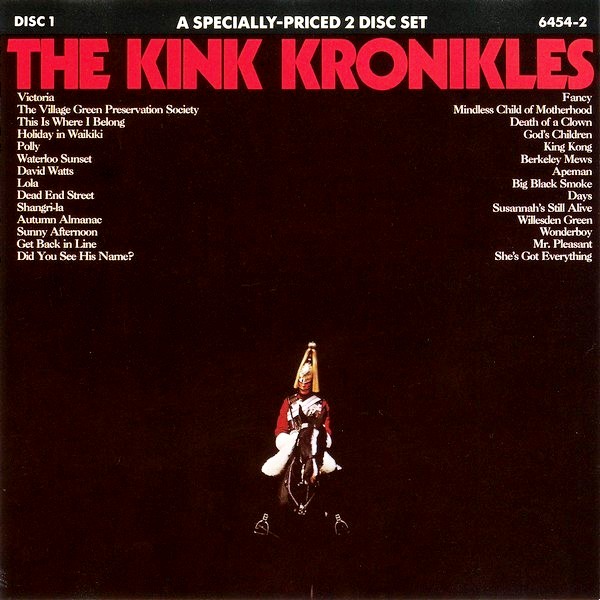
We were recently asked to quickly name our Top 15 favorite albums of all-time. Amongst the other usual (and unusual) suspects, we immediately thought of The Kink Kronikles. We first bought this Kinks album soon after it was released in 1972 (dang, 38 years ago). In short, we played it to death and still love to spin it regularly. As has been written about more eloquently elsewhere, the primary Kinks songwriter, Ray Davies, has had phenomenally prolific periods during which he penned preternaturally perfect pop and rock songs. The Kink Kronikles chronicles one such period and substantiates that Davies is one of the great songwriters of all time.
The first time we ever saw the Kinks live was in 1974 at UCSB’s Robertson Gym in support of their concept album, “Preservation: Act II.” We were bowled over by the band’s songs, theatricality and musicianship. We loved the band’s Act II show, but nothing could prepare us for the encore that night, consisting of their bigger hits such as Lola (it’s still remarkable that radio used to play songs like that), Waterloo Sunset, All Day and All of the Night and You Really Got Me. We still recall being blown away by Davies as a performer and songwriter. You certainly could not tell that Davies had suffered severe nervous breakdowns and survived a suicide attempt the prior year. All we knew, while singing/yelling along with the crowd to Lola, was that this gifted entertainer, his brother Dave, and the rest of the band brought unbridled joy to the attending crowd.
The Kink Kronicles was a USA-only compilation double-album (curated and compiled by great rock critic John Mendelsohn) of singles, B-sides, album tracks and previously unreleased tracks recorded between 1966 and 1970. While the album doesn’t include some of their biggest hits (e.g., You Really Got Me and All Day and All of the Night, on which Jimmy Page ghost-played some era-defining guitar) or some of our all-time favorite Kinks songs (e.g. the great pre-punk anthem, I’m Not Like Everybody Else, and the wistful Celluloid Heroes), it contains many of their best songs. The album is ultimately most successful in its inclusion of singles and rarities that complement each other well and present a complete picture of the band and the epoch.
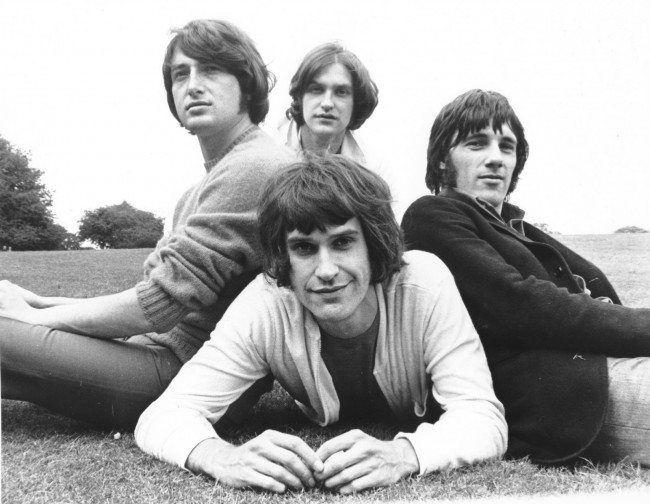
To our ears, The Kink Kronicles provides everything the Kinks meant at their best: invaluable vocals and highly individual music (eschewing all then-current trends), while combining raucousness and the beer-hall attitude that was always a large element of Kinks concerts. The complex bridges and key-changes are stunningly brilliant. And lyrically we hear the key elements of Ray Davies and the Kinks sensitivities: nostalgia, regular folks, village greens, and autumnal situations, leavened oft-times by the band’s off-center wit.
Robert Christgau, self-anointed “Dean of American Rock Critics,” gave The Kink Kronikles his highest rating and had this to say about it:
“Self-konfessed kultist John Mendelsohn has kreated an inkomparable kompilation. Great hits are few–the Kinks have made U.S. top forty only twice since their first best-of, with “Lola” and “Sunny Afternoon.” But great songs abound, assembled with a konnoisseur’s kraft (all right, I’ll stop) from available (and deleted) LPs, uncollected singles (told you I’d stop), and the vaults. Mendelsohn has little use for Ray Davies the would-be satirist (“Well-Respected Man,” etc.), apologizing even for such marginally “boorish” efforts as “King Kong” and “Mr. Pleasant.” So we get twenty-eight tracks that concentrate on Davies the lyric realist, the poet of pathos and aspiration, at his tuneful, readymade best. Definitely the world’s most charming (and untidy) ripoff artist. And he wrote “Waterloo Sunset,” the most beautiful song in the English language. A”
Rolling Stone magazine had this to say about the album: “Side 2 includes “Dead End Street” and “Autumn Almanac,” integral members of the Kinks’ fantastic seven-single string of 1966-68: “Sunny Afternoon,” “Dead End Street,” “Mr. Pleasant,” “Waterloo Sunset,” “Autumn Almanac,” “Wonder-boy,” and “Days.” You could take a complete course in rock melody — Ray Davies’ knack throughout is superlative — just by listening to these seven singles, and they’re all here on Kink Kronikles.”
Without further ado, check out below some of the best British pop songs ever written and committed to record. After beginning with our all-time favorite song of theirs, we move to the “complete course in rock melody” contained in the seven-song sequence acclaimed above by Rolling Stone.
The Kinks–Shangri-La
We love the story, musical variety and harmonies in this song. It’s amongst our all-time favorite songs. There are musical themes enough for four to five great songs in this five-minute song.
Cautionary lyrics:
“Here’s your reward for working so hard, gone are the lemon trees in the backyard, gone are the days when you dreamed of that car, you just want to sit in your Shangri-la.”
[audio:https://www.thelefortreport.com/blog/wp-content/uploads/1-10-Shangri-La.mp3|titles=1-10 Shangri-La]The Kinks–Sunny Afternoon
Any Libertarians out there ought to enjoy the opening derision in this song, but hopefully your focus will be more on the remainder of the song, and the chorus in particular.
[audio:https://www.thelefortreport.com/blog/wp-content/uploads/1-12-Sunny-Afternoon.mp3|titles=1-12 Sunny Afternoon]The Kinks–Dead End Street
We love the forlorn horn, the killer chorus and “Dead end!!” yells.
[audio:https://www.thelefortreport.com/blog/wp-content/uploads/1-09-Deadend-Street.mp3|titles=1-09 Deadend Street]The Kinks–Mr. Pleasant
Check out the keyboards of Nicky Hopkins (of the Rolling Stones’ band), the horns and the group vocals.
[audio:https://www.thelefortreport.com/blog/wp-content/uploads/2-05-Mr.-Pleasant.mp3|titles=2-05 Mr. Pleasant]The Kinks–Waterloo Sunset
What can one say about this song, but that we agree with Christgau’s assessment that it may be “the most beautiful song in the English language.” We love the song’s sentiment, the Beach Boys-harmonies, the descending bass lines, and spare guitar work. Perfect.
[audio:https://www.thelefortreport.com/blog/wp-content/uploads/1-07-Waterloo-Sunset.mp3|titles=1-07 Waterloo Sunset]The Kinks–Autumn Almanac
Again the harmonies and horns, but with also with Ray’s clever lyrics and vocal phrasing.
[audio:https://www.thelefortreport.com/blog/wp-content/uploads/1-11-Autumn-Almanac.mp3|titles=1-11 Autumn Almanac]The Kinks–Wonderboy
Here’s Ray and the band at their most ebullient, celebrating this wonderful life.
[audio:https://www.thelefortreport.com/blog/wp-content/uploads/2-02-Wonderboy.mp3|titles=2-02 Wonderboy]The Kinks–Days
The chorus says it all: “Thank you for the days, those endless days, those sacred days you gave me; I’m thinking of the day, I won’t forget a single day believe me; I bless the light, I bless the light that shines on me, believe me.”
[audio:https://www.thelefortreport.com/blog/wp-content/uploads/2-14-Days.mp3|titles=2-14 Days]The Kinks–Death of a Clown
What the heck, let’s throw in a Dave Davies gem.
[audio:https://www.thelefortreport.com/blog/wp-content/uploads/2-07-Death-Of-A-Clown.mp3|titles=2-07 Death Of A Clown]The Kinks–Village Green Preservation Society
We love the celebration of the simple life, as interpreted by Ray Davies.
[audio:https://www.thelefortreport.com/blog/wp-content/uploads/1-02-The-Village-Green-Preservation-Society.mp3|titles=1-02 The Village Green Preservation Society]The Kinks–Get Back in Line
Here’s Davies lambasting the workaday life and the impediments thereto. Who can resist the sentiments: “All I want to do is make some money and bring you home some wine; I don’t want you ever to see me standing in that line.”
[audio:https://www.thelefortreport.com/blog/wp-content/uploads/1-13-Get-Back-In-Line.mp3|titles=1-13 Get Back In Line]The Kinks–Victoria
Of course we must include their classic, proto-British rock anthem.
[audio:https://www.thelefortreport.com/blog/wp-content/uploads/1-01-Victoria.mp3|titles=1-01 Victoria]The Kinks–She’s Got Everything
And we have to include this rocker that hearkens back to an earlier period. “I’ve got a girl who’s oh so fine; she’s got everything.” Exactly. And we hear in this song (at 1:35ff) where Deep Purple stole that crunchy My Woman from Tokyo riff. Shameless.
[audio:https://www.thelefortreport.com/blog/wp-content/uploads/2-13-Shes-Got-Everything.mp3|titles=2-13 She’s Got Everything]The Kinks–Apeman
And finally, we end with the joyous Apeman, with its silliness mixed with the serious: “I don’t want to die in a nuclear war.” Indeed.
[audio:https://www.thelefortreport.com/blog/wp-content/uploads/2-03-Apeman.mp3|titles=2-03 Apeman]There you have it. We encourage you to go forth and explore the Kinks’ fine back-catalog and those 1965-1972 studio albums. Caveat emptor, though: the years since 1972 have not been hugely favorable to the band or its songs (with notable exceptions), so tread carefully with respect to albums issued after 1972.
Title.
(a) Purchaser shall have the right, at its cost and (if necessary) with Seller’s cooperation, to (i) order a commitment (the “Commitment”) for an Owner’s Title Insurance Policy from First American Title Insurance Company (the “Title Company”) showing title to the Property in Seller, dated after the Effective Date, setting forth any and all easements, liens, claims, restrictions, encumbrances or other exceptions to title (hereinafter “Exceptions”) together with all documents supporting such Exceptions, and (ii) select and engage a registered surveyor to perform an ALTA survey (“Survey”) of the Property in accordance with the requirements of the Title Company. After Purchaser’s receipt of the Survey, Purchaser will arrange to have Title Company update the title commitment (the “Final Commitment”) for the Property. If Purchaser, within thirty (30) business days after receipt of the Survey, or within ten (10) days after receipt of an updated Final Commitment showing new Exceptions, notifies Seller that it disapproves any Exception identified in the Final Commitment or any matter disclosed by the Survey (hereinafter collectively “Defects”), Seller shall use its commercially reasonable best efforts to, by the Closing Date, eliminate or remedy to Purchaser’s satisfaction such Defect(s). If Seller is unable to eliminate or remedy such Defect(s) within said period, Purchaser may either, at its election, terminate this Agreement with written notice given to the Seller (in which event neither party shall have further obligations hereunder and the Deposit will be remitted to Purchaser), or proceed with the purchase of the Property subject to such Defect(s). Notwithstanding anything to the contrary contained herein, the Seller shall cure or dispose of all such defects or objections to title which are fixed in amount and which can be cured by payment of a certain and ascertained sum of money only (such as mortgages, taxes, mechanics’ liens, etc.), and if the Seller shall fail to cure or dispose of such defects or objections, the Purchaser shall have the right to deduct from the purchase price the amount which the Seller would be required to pay to cure or dispose of such defects or objections.
(b) The Seller agrees to execute and deliver to the Title Company at Closing such documentation, if any, as the Title Company shall reasonably require to evidence that the execution and delivery of this Agreement and the consummation of the transactions contemplated hereby have been duly authorized.
Nov
Early Decemberists–Down by the Water
in Music
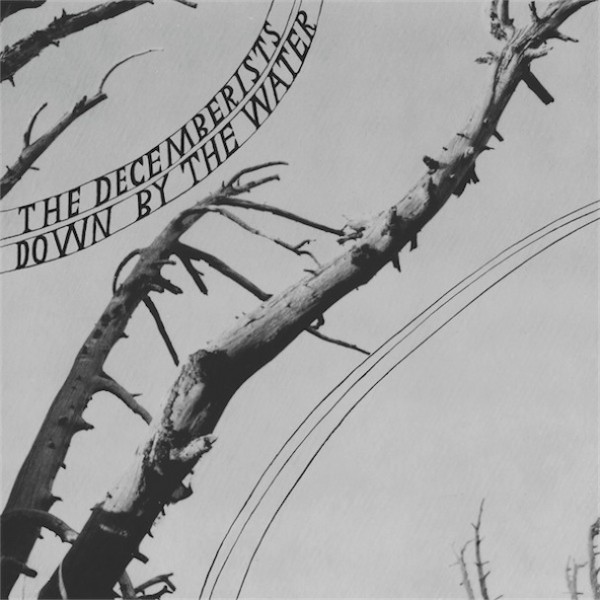
One of our historically-favored indie bands, The Decemberists, has announced the release of their next record, “The King is Dead,” on January 18th. We hope it’s a vast improvement over their last record, “The Hazards of Love,” which bored us to tears (save a couple of songs) and went straight to the dustbin (said with that faux-British accent adopted on song by American bandleader, Colin Meloy). The title of the new record has fueled speculation that it’s an allusion/homage to the great Smiths record, “The Queen is Dead.” We shall see, though it hasn’t hurt that Meloy has been covering Smiths songs live recently.
Down By The Water is the first sampling of the imminent record, and if it is any indication, “The King is Dead” could be a resounding return to regality. The great Gillian Welch meshes perfectly on the song, as does R.E.M.’s Peter Buck on 12 string. Sounding very R.E.M-ish (circa “Document”), we love the added harmonica and overtones.
We hope that “The King is Dead” brings the band back to its prior creative heights (like on “Picaresque”) and avoids the nadir of Hazards of Love. The track list for ‘The King is Dead’ is tentatively as follows:
1. ‘Don’t Carry It All’
2. ‘Calamity Song’
3. ‘Rise to Me’
4. ‘Rox in the Box’
5. ‘January Hymn’
6. ‘Down by the Water’
7. ‘All Arise!’
8. ‘June Hymn’
9. ‘This Is Why We Fight’
10. ‘Dear Avery’
Check out Down by the Water below, along with We Both Go Down Together off “Picaresque” and Bridges & Balloons, a cover of the great Joanna Newsom’s song that was included in the 2005 Believer Magazine Covers Issue.
The Decemberists–Down by the Water
[audio:https://www.thelefortreport.com/blog/wp-content/uploads/The-Decemberists-Down-By-The-Water.mp3|titles=The Decemberists — Down By The Water]The Decemberists–We Both Go Down Together
[audio:https://www.thelefortreport.com/blog/wp-content/uploads/02-We-Both-Go-Down-Together.mp3|titles=02 We Both Go Down Together]
The Decemberists–Bridges & Balloons
[audio:https://www.thelefortreport.com/blog/wp-content/uploads/01-Bridges-Balloons.mp3|titles=01 Bridges & Balloons]
Nov
The Writer’s Almanac On Election Day (and Every Day Hereafter)
in Poetry


As we’ve written about before, Garrison Keillor is a national treasure. He is for us America’s Lifetime Entertainer Laureate.
If you haven’t checked it out before, check out Keillor’s stellar daily dose of poetry, prose and literary history here at The Writer’s Almanac. Today’s offering gives us the following C.G. Hanzlicek poem:
“To Be a Danger
Just once I’d like to be a danger
To something in this world,
Be hunted by cops
And forced into hiding in the mountains,
Since if they left me on the streets
I’d turn the country around,
Changing everyone’s mind with a word.
But I’ve lived so long a quiet life,
In a world I’ve made small,
That even my own mind changes slowly.
I’m a danger only to myself,
Like the daydreaming night watchman
Smoking his cigar
Near the dynamite shed.
“To Be a Danger” by C.G. Hanzlicek, from The Cave. © University of Pittsburgh Press, 2001.”
Nov
The National Pastime–Get Out and Vote
in Music


The National provide the perfect soundtrack to vote by; so listen in and get out!!
Whether exhorting in Mr. November, or semaphoring fan-democracy in the “Alternative Take” below of Terrible Love, or lamenting a political campaign and vote (of sorts) wasted in Vanderlyle Cry Baby (one possible interpretation), the care and encouragement is all there.
So get out and vote today. No excuses.
Mr. November
“I used to be carried in the arms of cheerleaders…I’m Mr. November”
Terrible Love–Alternative Take
“It takes an ocean not to break!”
Vanderlyle Cry Baby
“Leave your home
Change your name
Live alone
Eat your cake”
And finally, this version of Terrible Love, which includes Sufjan Stevens:
Once again we lied. Here’s a great crowd-sing of Vanderlyle from the recent Fox Pomona stop:

